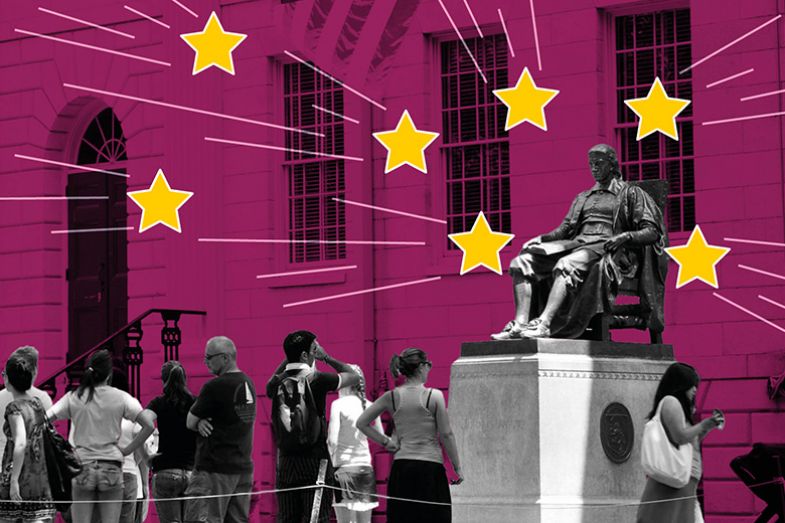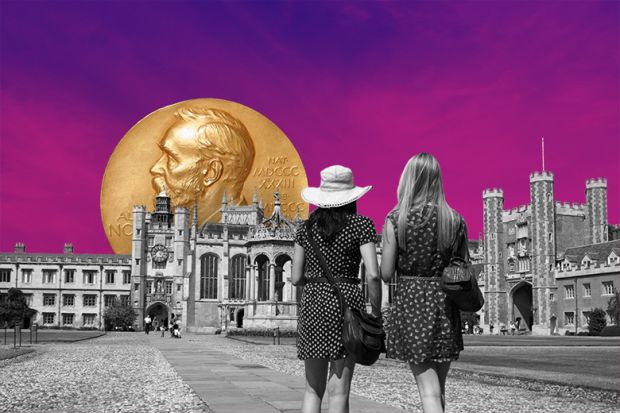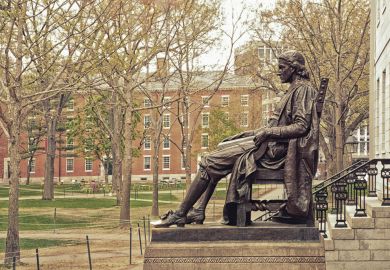Browse the full results of the World Reputation Rankings 2025
Science superpowers rise and fall, academic disciplines will fall from favour and scholars’ h-indexes wax and wane. University reputations are arguably a different matter, with the aura attached to prestige institutions seldom dimmed by less-than-stellar bibliometrics or even dips in rankings performance.
This reputational resilience was illustrated by a recent exchange from the UK Parliament’s Science and Technology Committee. Pushing back on concerns from Royal Society president Adrian Smith that UK research might fall behind rival nations without additional support, Conservative MP Kit Malthouse countered that British research was in rude health, stating it was “still the case that Trinity College Cambridge has more Nobel prizes for science than the whole of continental Europe put together”.
While Trinity’s Nobel tally (34, including alumni and staff, or 29 for science) is impressive, it is miles behind Europe’s overall haul (Germany has 115 laureates alone). More pertinently, there are only two living Nobel laureates that were educated at Trinity (one of whom, Brian Josephson, won in 1973), suggesting it is not the Nobel prize factory it once was.
Yet Malthouse’s statistical zinger seems plausible given the college’s past achievements, undoubted pedigree and air of Oxbridge excellence. That Smith did not correct the former education secretary also suggests there is cultural and political value in having institutions with these reputations, even if this is based on faulty mathematics.
But how can you ever judge university reputation when it often rests on subjective qualities – history, academic heritage, research culture, external engagement, a pleasant campus – as much as bibliometrics, financial spending or outstanding PhD graduates? For many universities, Times Higher Education’s World Reputation Rankings are still a useful place to start, a brand barometer that offers helpful insights into the institutions that academics think are excelling in teaching and research, and might therefore be regarded as the best places to work, research and study.
This year Harvard University tops our reputation ranking for the 14th year running, closely followed, in joint-second place, by the Massachusetts Institute of Technology (MIT) and the University of Oxford – which has topped the overall THE World University Rankings for the past nine years. It is the highest reputation rank for a UK institution in a decade, with the rise suggesting that its prestige for academic excellence is finally starting to catch up with its performance.
Inside the top 10 are Stanford University (joint fourth with the University of Cambridge) and Ivy Leaguers Princeton (seventh) and Yale (ninth) universities, as well as China’s Tsinghua University (eighth) and Japan’s The University of Tokyo (10th) – the latter 18 places higher than its 28th world rankings finish.
World Reputation Rankings 2025: top 10 most prestigious universities
| Reputation rank 2025 | Institution | Country/territory |
| 1 | Harvard University | United States |
| =2 | Massachusetts Institute of Technology | United States |
| =2 | University of Oxford | United Kingdom |
| =4 | Stanford University | United States |
| =4 | University of Cambridge | United Kingdom |
| 6 | University of California, Berkeley | United States |
| 7 | Princeton University | United States |
| 8 | Tsinghua University | China |
| 9 | Yale University | United States |
| 10 | The University of Tokyo | Japan |
LMU Munich, KU Leuven, Sorbonne University, the University of Melbourne, University of Hong Kong and the University of Manchester all join the top 50 this year, in a list that now includes 300 institutions for the first time (up from 200 previously).
Although critics will no doubt complain that the annual invitation-only survey, which received responses from more than 55,000 academics for the 2025 edition of the ranking, favours institutions with a familiar brand, its revamped methodology has tried to ensure scholars focus on research and teaching excellence in their field. Respondents were asked to nominate up to 15 institutions they saw as being excellent in teaching and research – with these nominations accounting for a combined 60 per cent of institutional scores. They were also presented with a list of five institutions informed from their publication history, which they were asked to rank in numerical order, which made up 20 per cent of the score.
Institutions with votes coming from a wide range of countries and subject areas were deemed to have a more robust reputation than those with a narrower voter base, and this voter diversity measure accounted for the remaining 20 per cent of the score.

These efforts to aggregate academic opinion at a global scale, however painstaking, may not win over those distrustful of rankings – reputation or otherwise. That is partly because “reputation is a summary measure, typically backward looking”, explained the MIT-based Nobel economics laureate Simon Johnson, who believes such reputational matters should not overly influence scholars’ decisions on where they work.
“What you really care about is quality of colleagues, and whether this is a productive place [to do research]. Does it encourage you to ‘swing for the fences’?,” the Sheffield-born economist told THE, using a baseball metaphor from his adopted homeland.
That concern is shared by Robert Insall, professor of computational cell biology at UCL, who observed that “while reputation is real…the actual reputation of an institution…usually changes much slower than the people in the institution”, suggesting a certain degree of “riding coat-tails” by certain academics in some cases.
In the current climate, however, the idea of university reputation, however inexact, cannot be dismissed. “Reputation can be worth quite a lot of money in 2025 – it’s the difference between bankruptcy and survival for some UK universities,” he said, referencing the important role it plays in recruiting overseas students whose tuition fees are helping to prop up institutions’ ailing finances.
It is little wonder that universities, therefore, have been seeking ever-inventive ways to bolster their brand. The University of Leicester has argued it deserves to join the Russell Group, noting this brand would help its reputational standing with would-be international students, while several universities have successfully fought to change their names to achieve a similar effect. Most controversially, the University of Bolton won permission to become the University of Greater Manchester despite protests from its older, higher-ranked neighbour, the University of Manchester, that it was unfairly seeking to benefit from its hard-won reputational clout.
In UK politics, the name recognition of Oxford and Cambridge universities has helped to revive plans for the “Oxbridge growth corridor”, which the chancellor Rachel Reeves claims will be worth £78 billion to the economy by 2035.
“Reputation used to be something that institutions didn’t talk about – it was seen as a bit cringe,” reflected Tania Rhodes-Taylor, executive director for communications and external affairs at King’s College London. “But a top 200 placing – certainly a top 100 placing – in the rankings makes a huge difference to international undergraduate and postgraduate recruitment. In some cases, governments won’t sponsor students unless it’s a top 100 university,” she continued.
Some will argue that older, richer universities have an inbuilt reputational advantage that means these tables are rigged in their favour. That analysis overlooks how the big names continue to invest hugely in research but also undertake other activities that garner acclaim from academics and non-academics alike, argued Rhodes-Taylor. “Why does Cambridge or Oxford finish in the top two for the UK most years? Some will argue it’s heritage or history but there is still incredible science happening there, plus there are entirely new things like the spin-outs from innovative research happening in those areas. Academics notice these things too, even if these don’t strictly fall into their subjects,” she said.
Indeed, academics are more susceptible to judging institutions on extraneous factors beyond disciplinary excellence than they might admit. A 2016-17 study by the World 100 Reputation Network – now part of THE – which polled 800 academics explains how scholars involved in these surveys will generally name five outstanding universities based on their own personal experiences but fall back on big brands for the final 10 names (although the new methodology changes aim to encourage voters to consider a broader range of institutions).
However, the latest reputation ranking suggests it is possible for institutions to improve their standing in reputational terms. This year the University of Helsinki and UNSW Sydney (81st and joint 97th respectively) enter the top 100, while the University of York, Stockholm University and Vrije Universiteit Amsterdam move into the 101-150 band, having all previously been in the 176-200 band.
Those to fall out of the top 100 include Bauman Moscow State Technical University, which is now rated in the 201-300 band having been at 61-70 in 2023, and the Korea Advanced Institute of Science and Technology (KAIST), which fell from 71-80 to 101-150.
“No one can rest on their laurels for very long or they’ll be overtaken,” insisted Rhodes-Taylor, noting how Saudi Arabia’s considerable investment in research has recently translated into universities with growing reputations for research excellence, at least at a regional level.

Yet does this fretting over reputation really add up to much beyond creating a beauty contest for would-be international students? Does any of it really matter to the academic seeking to do their best work? While it is easy to be cynical, institutional reputation does matter for scholars, particularly more junior ones, believes Timothy Devinney, chair and professor of international business at the Alliance Manchester Business School.
“For junior people who have no personal reputation, where they graduated and who were their advisers matters a lot and those individuals might want to go to a place where they can ‘borrow’ the halo effect of the reputation of the institution,” he explained.
”If no one knows Jane Smith, she will probably choose Harvard over the University of Massachusetts despite the fact that U. Mass might actually have better scholars in her area,” he said. “She knows that she probably can leverage having been at Harvard when she goes back into the job market more readily than elsewhere – in the same way you see people say they worked for McKinsey or Google even if they only had some short-term minor role.”
“For a senior person, it makes no difference really,” Devinney continued. “Someone like me has their own personal reputation that is separate from whatever institution I am at – in fact, the reason well-known, well-published senior people command a premium is that rather than their getting the halo effect of the institution, the institution gets a halo effect from the person’s reputation.”
That said, institutional prestige can come with its perks for senior scholars too, admitted Devinney. “I noticed that when I was on sabbatical at one of the major business schools in the US, I almost always received quick responses from corporate executives and policymakers when I used the email address of that institution rather than my ‘home’ institution,” he reflected.
“The reason wasn’t just snob appeal, it was the fact that uniformed executives or policymakers who didn’t know me were making an inference about me from the institution, maybe ‘Surely, if I was at that institution, I was someone worthy of speaking to’,” he said.
Drawing on his time at the University of Chicago and Carnegie Mellon University, Devinney reflected that working at top-ranking institutions also had its downsides, noting how managers can be ruthless with “marginal scholars” who are not hitting the heights of their peers.
“With reputation comes a brutality related to keeping that reputation – I have been at numerous places where it was clear who fell into that category and the system expunges them. If you are working with people with great reputations you have to provide far more value than you would if you were working with weaker scholars. It might sound unfair and Darwinian but it is the reality of how science advances rather than degrades.”
With the benefits of reputation accruing for both institutions and academics alike, it seems the desire to burnish brands in a multitude of ways will not be going away quickly. Yet as UCL’s Insall remarked, reputational matters are sometimes linked to far bigger issues than the performance of scholars or their departments.
“It takes ages to build up a good reputation, but an institution can lose it very quickly if it takes a wrong turn. And it seems to me that shortage of cash has made a lot of UK universities take really serious reputational risks,” he reflected, referring in particular to “admitting overseas students who aren’t qualified, or packing classes with people who aren’t competent or whose language skills aren’t good enough”.
“But the most serious harm you can do to your reputation is to treat your own staff badly,” he continued, noting how institutions were “being driven into it by cash shortages” with job cuts likely to see “morale tank and staff and former staff going around bad-mouthing the place”.
“Historically universities that do that take a very serious hit and plenty are doing that now,” he said.
Register to continue
Why register?
- Registration is free and only takes a moment
- Once registered, you can read 3 articles a month
- Sign up for our newsletter
Subscribe
Or subscribe for unlimited access to:
- Unlimited access to news, views, insights & reviews
- Digital editions
- Digital access to THE’s university and college rankings analysis
Already registered or a current subscriber?




